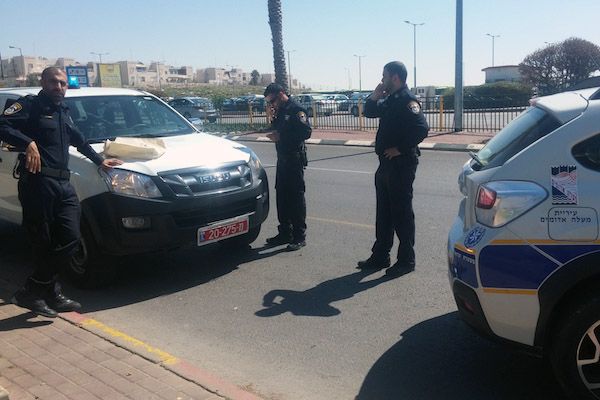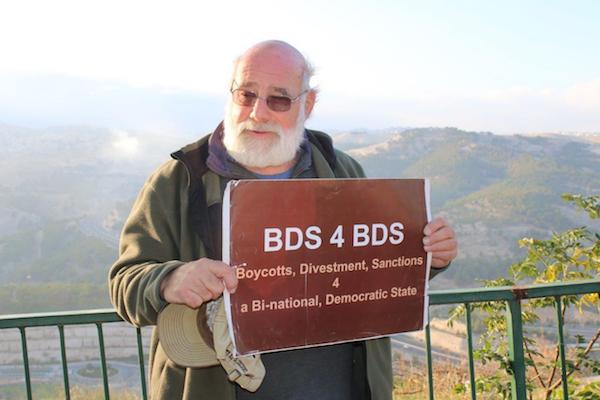Instead of simply announcing that it opposes BDS, which would be a perfectly legitimate stance, the Israeli government is criminalizing the movement and its advocates. The results won’t be pretty.

On March 8 police near Jerusalem picked up an Israeli citizen who was just standing on the street. He was not doing anything illegal. Someone who lived in the neighborhood reported him on suspicion of carrying material related to BDS; and while it is not illegal for Israelis to carry material about BDS in territory under Israel’s control, the police answered the call.
Jeff Halper, the director of the Israeli Committee Against House Demolitions (ICAHD) was speaking to a tour group in Maaleh Adumim, a large Jewish settlement in the West Bank. The police detained him in a place that was one of his regular stops with tour groups, he explained.
“I wasn’t talking about BDS or holding a sign that day,” he wrote in an email exchange with +972 Magazine, “but I sometimes do and so do our other guides. So someone called the police. They should have said to the caller: ‘Thanks for letting us know, but this is a democracy and people can talk on the street (even about BDS).’ But they didn’t of course, and detained me for ‘incitement.'”
BDS is the Boycott, Divestment and Sanctions movement. Its advocates pursue a variety of non-violent tactics aimed at pressuring Israel to apply international law to the Palestinian residents living under its sovereignty.

Last week the Knesset approved a law barring entry to foreigners who support BDS. An earlier anti-BDS law, commonly called the Boycott Law, was passed in 2011. The 2011 law gives Israelis the right to bring civil suit against BDS advocates in cases where they can prove their livelihood has been undermined as a result. Both laws have been widely criticized for violating basic principles of freedom of speech. Both apply to boycotts not only of Israel, but also of its settlements in the West Bank.
Yet it is still not against the law for Israeli citizens to support or even call on others to support BDS. They just have to bear in mind that they might be sued in civil court for their advocacy.
+972 Special Coverage: The Boycott Movement
The police did not arrest Jeff Halper on Monday, but the fact that they detained and questioned him speaks to the increasingly authoritarian climate in Israel in general, and to the profoundly distorted views on BDS specifically.
Instead of simply announcing that its official position is to oppose BDS, which would be a perfectly legitimate stance, the Israeli government has instead chosen to criminalize the movement and its advocates. Prime Minister Benjamin Netanyahu and members of his cabinet have used loaded language to conflate BDS with anti-Semitism, gratuitous hatred of the State of Israel — and even with violence.
This discourse has spread to the Jewish diaspora, with many mainstream Jewish organizations and institutions following the Israeli government’s lead. Among Jews who are associated with the organized community, BDS has become almost axiomatically associated with anti-Semitism. There is almost no conversation about the matter.
In an email exchange with +972 Magazine, Jeff Halper unpacked the incident Monday:
The fact that someone can be detained for incitement just on suspicion of speaking about BDS shows how far we’ve gone towards fascism and repression in [minister of justice] Ayelet Shaked’s police state.
The incident was minor, but the implications are scary. There is certainly a targeting of anti-occupation/BDS activists (for the Israeli authorities they’re both the same). I know of a number of foreign activists who have been deported or not let in (like Luisa Morgentini, an Italian/European parliamentarian), laws are already in place to deny Israeli groups dealing with BDS or human rights (the same to the Israeli authorities) funding.
And I expect some kind of law or regulation or sanctions (like not being able to teach or work) against BDS activists in general — or anyone critical of government policy. We’re in a new Bibi/Ayelet/Trump world, and it’s a slippery slope.
In his 2013 book, “The End of Jewish Modernity,” historian Enzo Traverso argues that since the 1940s, mainstream Jewish thought has been in a period of stagnation. Our discourse has become reactionary and conservative, with a deracinated and impoverished identity resting uneasily on the twin pillars of the Holocaust and Israel. One can see the evidence to support Traverso’s thesis in the current tenor of the Jewish discourse about the BDS movement.
For decades Jewish political and community leaders have conflated criticism of Israel with anti-Semitism, to the point that journalists in the United States are afraid to criticize Israeli policy, lest they be accused of anti-Semitism. In describing BDS, community leaders and Israeli politicians have raised the specter of a Nazi boycott of Jewish shops in Germany during the 1930s. They conflate boycott as a non-violent tool to end Israel’s military occupation of the Palestinians, with the desire to destroy the state of Israel.
For Jews, well-primed with three generations of post-Holocaust trans-generational trauma and intellectually weakened by their educational system’s abject failure to transmit their rich, fascinating, millennia-old history and culture preceding the Holocaust, this is the result — in Israel at least (and to a much lesser extent in the diaspora): a fearful people, led by a fear-mongering and increasingly authoritarian prime minister, who have become so detached from the norms of civil society that they inform on a fellow citizen who expresses a dissident opinion.
Now where have we heard of that kind of behavior before?


